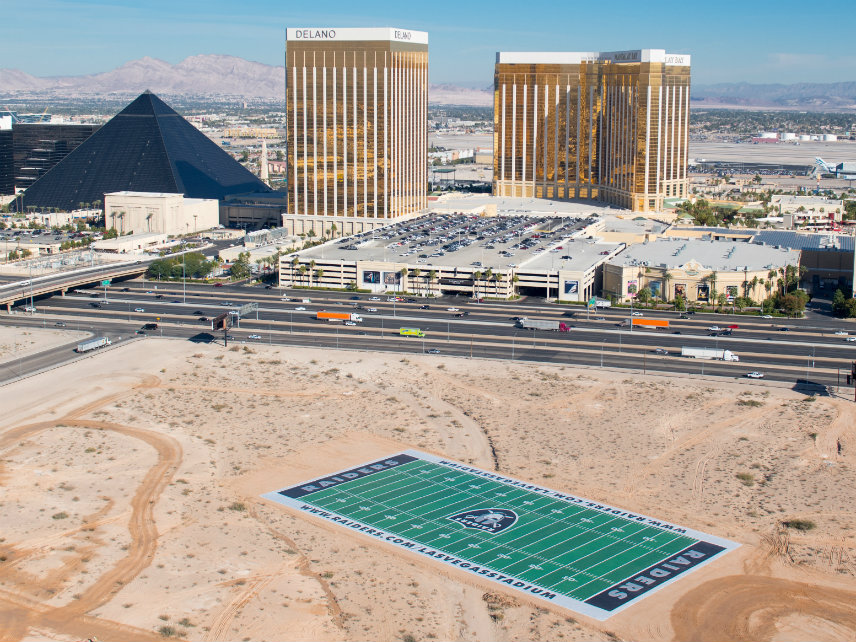Trump and the NFL Agree: Taxpayers Should Keep Subsidizing Stadiums
The NFL lobbied hard, and the president reportedly lent a hand.

After feuding with the National Football League for months, over everything from how players act during the national anthem to whether the games are violent enough, President Donald Trump appears to agree with the league about at least one thing: Taxpayers should subsidize stadiums.
The Republican-crafted tax reform bill, which is expected to pass both chambers of Congress today, maintains the current federal tax exemption for bonds issued to pay for the construction of stadiums.
An earlier version of the bill, which cleared the House in November, would have done away with that exemption (though public projects such as infrastructure could have been funded with tax-free bonds). The NFL lobbied to kill that change, and the version of the bill that emerged from the conference committee deleted the provision.
Preserving the ability to use tax-exempt bonds for sports stadiums was "a priority for Mr. Trump," according to a GOP aide who spoke to The Wall Street Journal.
"I can't think it's any coincidence that after the House passed a repeal of the tax-exempt bond stadium subsidy, the NFL weighed in publicly—and, I have no doubt, other leagues did so privately—to rail against the measure, and then the congressional conference committee killed it," says Neil deMause, author of the anti-stadium-subsidy book Field of Schemes. "Pro sports leagues spend heavily and well on lobbyists, which is exactly why all attempts to reign in the billions of dollars a year in local and federal subsidies for stadiums have gone nowhere."
Unlike other, more direct ways that state and local governments subsidize the construction of professional sporting palaces, the federal rules exempting municipal bonds from taxation mean that all taxpayers from coast to coast help to underwrite a stadium project. Fans of the Boston Red Sox helped build the new Yankee Stadium in New York City, which relied on $1.6 billion in municipal bonds. Football fans everywhere will underwrite the construction of the Oakland Raiders' new home near the Las Vegas Strip, set to open in 2020 at an estimated cost of $1.9 billion.
According to a recent analysis by the Brookings Institution, more than $13 billion in municipal bonds have gone to 45 major professional sports stadium projects since 2000.
"Tax-exempt muni bonds are presented to voters as not costing them anything, but the result is always that other forms of taxes must rise to compensate," says Gregg Easterbrook, author of the Tuesday Morning Quarterback column at The Weekly Standard. "They're like a restaurant that says, 'Your cheeseburger is free but the soda is mandatory and costs $10 a glass.'"
Almost every professional sports stadium in America has also been granted a special property tax exemption by their local and state governments, Easterbrook points out.
As opposition to stadium subsidies has grown, Congress has at least started paying lip-service to the idea of closing the municipal bond loophole. A bipartisan proposal introduced earlier this year by Sens. Cory Booker (D–N.J.) and James Lankford (R–Okla.) would prohibit local officials from using municipal bonds for stadium projects. Its best chance of passing, alas, was probably as part of the tax bill.
Ironically, the municipal bond loophole that pro teams now use to get back-door subsidies arose because Congress tried to close a different stadium-subsidizing loophole in 1986. Previously, teams had used tax-exempt private revenue bonds to fund construction, but when Congress passed the last major tax reform bill, it said those could no longer be used for stadium projects. So local governments turned to tax-exempt municipal bonds instead.
In the midst of his anthem spat with the NFL in October, Trump took to Twitter to call for ending the league's special tax breaks.
Why is the NFL getting massive tax breaks while at the same time disrespecting our Anthem, Flag and Country? Change tax law!
— Donald J. Trump (@realDonaldTrump) October 10, 2017
It's unclear whether the president was talking about the stadium-subsidizing rules for municipal bonds in that tweet—but if he really wanted to end the NFL's "massive tax breaks" and "change tax law," the bill set to pass today would have been a good place to start. But it's probably not surprising that a wealthy businessman who for years wanted to own an NFL franchise came around to agree with 32 other wealthy businessmen that taxpayers should foot the bill for their multi-billion-dollar playgrounds.

Show Comments (27)